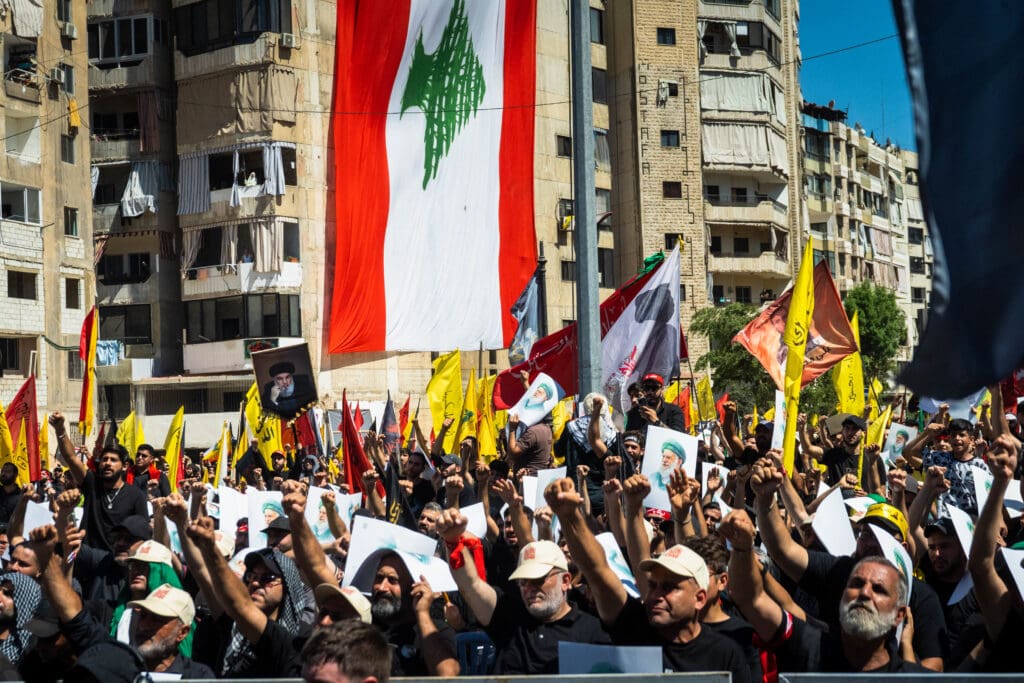The recent visit of U.S. special envoy Tom Barrack to Beirut has revived the perennial question of Hezbollah’s fate were it to give up its arms. Three weeks after handing the Lebanese government a letter demanding it take immediate steps to disarm the group, Barrack presented a roadmap for implementation that offers Beirut a window of a few months to make tangible progress toward this goal, as well as to initiate the financial and economic reforms demanded by international institutions.
Lebanon submitted a preliminary response to the letter, the details of which were not officially made public. And Barrack expressed satisfaction with the response, without elaborating further. However, leaks from sources close to the Lebanese officials who met him indicated that Beirut had renewed its commitment to disarming Hezbollah south of the Litani River within the specified deadline, while full disarmament would be postponed until a later stage.
The U.S. Carrot and Stick
Although Barrack represents the Trump administration in these negotiations, there is pressure in Washington to take a harder line on Hezbollah disarmament in ways that conflict with Barrack’s position but also intersect on substance and implication. The competing position has been articulated by David Schenker, a veteran diplomat and outspoken supporter of Israel who served as Assistant Secretary of State for Middle East Affairs during President Donald Trump’s first term.
While in Beirut, Barrack said that the task of disarming Hezbollah falls entirely on the Lebanese state, denying that the U.S. had any plan to break up the group. He explained that Hezbollah is classified as an international terrorist organization, but also has 13 seats in the Lebanese parliament—meaning that reconciling its military and political aspects is a domestic matter. He also urged the government to tackle the demarcation of Lebanon’s borders with Israel and Syria under one bracket, and suggested a 90-day truce as a trust-building measure. Barrack recalled that the 1989 Taif Agreement, which ended Lebanon’s 15-year civil war, and the Lebanese constitution, both stipulate that the state have a monopoly on arms and warned of recurring crises until this is implementated. He also stressed that the Gulf states would only fund Lebanon’s reconstruction if they saw a serious commitment, and genuine progress, on disarmament.
Schenker, meanwhile, has argued that Barrack’s proposal is too soft, and that there is no time for appeasing Hezbollah. He has called for sanctions on Parliament Speaker Nabih Berri and members of parliament who block progress, the “slow-rolling” of U.S. support for World Bank and International Monetary Fund financing, the targeting of state officials cooperating with Hezbollah, and pressure on the army and security forces to stop coordinating with it, as well as the dramatic scaling-back of the United Nations’ peacekeeping mission, UNIFIL. Schenker concluded that Israeli raids would continue, and that Beirut may even prefer this option over confronting Hezbollah directly.
Some see Schenker’s words as the flip side of Barrack’s diplomacy—the stick to his carrot, as it were. While Barrack’s words give Hezbollah breathing space, those of Schenker place the issue of Hezbollah’s weapons at the door of the Lebanese state, leaving Israel to finish off what it has started.
Explosive, Conflicting Interests
Beyond the situation inside Lebanon, the political calculations in Washington and Tehran are also having an impact on negotiations. The Trump administration is seeking a tangible achievement in the Middle East after facing disappointment on three other fronts. The first is its failure to impose a quick solution in Ukraine by subduing Putin, even at the expense of Europe. The second is the fact that the U.S.-Israeli escalation against Iran resulted in a draw, which has prompted Trump to seek out other overseas victories to strengthen his position ahead of looming midterm elections. Third, efforts to reach a truce in the war in Gaza have stalled, despite Trump’s pressure on Israeli Prime Minister Benjamin Netanyahu during talks in Washington on July 7-8, which—according to envoy Steve Witkoff—ended up resolving all four points of contention except the Israeli army’s withdrawal from Gaza.
Tehran also does not appear prepared to make concessions without a price, especially after it emerged from its confrontation with the U.S. and Israel more domestically cohesive and present on the international stage. Iran refuses to allow the U.S. to achieve through negotiation what it was unable to achieve through war, and it will not enter any serious negotiation process unless the West recognizes that it is a regional player that cannot be bypassed. Tehran has expressed this political intransigence by suspending its cooperation with the International Atomic Energy Agency and deciding to go dark on its uranium stockpile, providing an additional negotiating card. This has implications for two other sensitive files: The Yemen-based Houthis’ refusal to stop the war in the Red Sea, and Hezbollah’s hardline stance on disarmament, the most sensitive issue for all sides.
Hezbollah’s Domestic Dilemma
Practically speaking, Lebanon faces some dilemmas. The first is the matter of how Israel, which is continuing to violate the ceasefire and carry out assassinations on Lebanese soil, will respond to any official stance by the Lebanese state. The second is how to manage the issue of Hezbollah’s weapons domestically without risking a slide toward a confrontation that would threaten the peace. What is needed today is a domestic and external political effort, especially by Saudi Arabia, Qatar and France, to reach a formula that guarantees Hezbollah its security as a political actor in exchange for handing over its weapons, as part of a broader settlement that brings about a new balance in Lebanon, defines the role of the army and establishes the distribution of power.
In the meantime, Hezbollah has been mobilizing its base through large public gatherings like the Shiite commemoration of Ashura in early July. The group’s new leader, Sheikh Naim Qassem, declared that Israel must implement the ceasefire agreement and withdraw from the five locations it still occupies on Lebanese territory before its domestic issues can be addressed. He warned that the movement will not remain silent, and that it is capable of defeating Israel.
Despite such bellicose rhetoric, Hezbollah appears to be on the back foot. Although Israel continues to escalate in southern Lebanon, Hezbollah has not launched a military response, lest it be exposed. Its domestic alliances are unraveling, leaving the party oscillating between contradictory positions—sometimes calling for calm and other times threatening and launching accusations of betrayal. Remarkably, Hezbollah—once the tip of the spear of Iran’s “forward defense” structure in the region—stayed completely out of the June war between Israel and Iran.
President Joseph Aoun and Prime Minister Nawaf Salam have avoided tackling the question of Hezbollah’s weapons, allowing the group to buy time, waiting for Tehran’s decision in its negotiations with the West. Given the Islamic Republic’s lost position in Syria, Tehran will not easily relinquish another key asset in Hezbollah’s arsenal. So will Hezbollah respond to Israel’s escalation and the American threat by embarking on a new, costly military confrontation?
Amid this stalemate, some believe that another confrontation, despite the cost, could galvanize Lebanon’s Shiites ahead of difficult elections in the wake of the destruction and depopulation of villages in their strongholds in the south, the Bekaa Valley and the southern suburbs of Beirut. Will Hezbollah work to strengthen these feelings, presenting itself as both victim and hero to consolidate the “legitimacy” of its weaponry? This has happened in the past, and there is nothing to prevent it from happening again. Therefore, the key question today is that of the guarantees Lebanon and the Lebanese can offer Hezbollah in exchange for handing over its weapons and becoming a civilian political force, rather than a military one. Barrack’s words suggest that America is willing to accept this solution—but the question remains of whether Israel would accept it without corresponding security guarantees.


